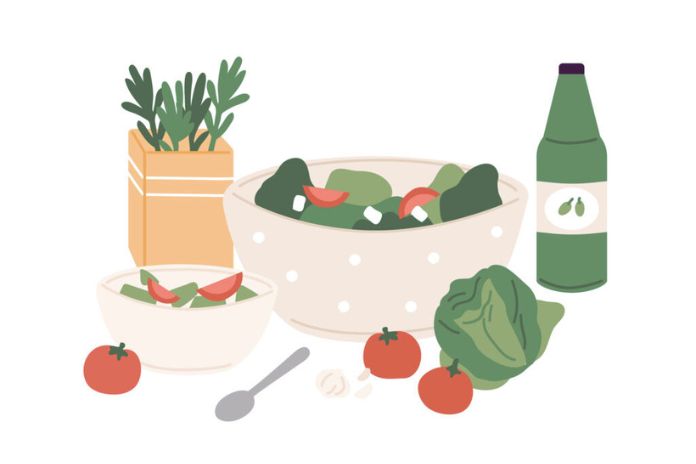Concern about health, the environment, and the mistreatment of animals are some of the reasons that have led an ever-growing group of people to reduce or even abandon the consumption of animal products. The vegan wave and the adoption of vegetarian food are undeniable trends.
However, doubts about these movements also arise as these themes become more common and attract the population’s attention. After all, what is the difference between vegetarian food and vegan food? What are the common points between these two food models?
If you also have these questions, continue reading. We will explain these concepts and show the objective of the groups that adhere to these practices and the best option for those who want to adopt a healthy diet. Check out!
Vegetarian Food: What Is It?
A vegetarian diet is based on the exclusive consumption of plants and products of plant origin. Therefore, it excludes eggs, milk, meat, and their derivatives.
Some call people who don’t consume these animal derivatives, strict vegetarians. However, some chains prefer to call them full vegetarians since their entire menu is plant-based, based on consumption of plants.
However, we know that in most cultures, the consumption of animal foods is ingrained. Since childhood, people consume milk, eggs, and meat; when they reach adulthood, they may face some difficulty removing these products from their menu.
Therefore, even when aware that the consumption of animal foods is related to developing a series of health problems, they continue to use some of them. They practice a “softer” form of vegetarianism, which can be subdivided into different groups:
Lacto-Ovo Vegetarianism
Lacto-ovo vegetarians do not consume meat but use eggs, milk, and their derivatives. They form the largest group among vegetarians even because, for many of them, this initial reduction is a gateway to life without food of animal origin.
Furthermore, there are only two ways to obtain vitamin B12, which is very important for the body: consumption of animal foods and supplementation. For this reason, many vegetarians continue to consume eggs and milk until they acquire more knowledge about a food strategy with all the necessary nutrients.
Lacto Vegetarianism
In addition to not eating meat, Lacto vegetarians are another group that excludes eggs from the menu. However, they consume milk and its derivatives, such as yogurt, cottage cheese, kefir, etc. India is a country where this food model is quite common.
Ovo Vegetarianism
Unlike the previous group, Ovo vegetarians do not eat meat or milk but include eggs.
Pesco-Vegetarianism
The pes-co-vegetarian group, or pescetarian, does not use red meat or chicken but consumes fish and other seafood. This is a permanent option for some, while others join during a transitional period until they adapt to vegetarianism.
Vegan Food: What’s The Difference?
Although many think of veganism as a food option, this philosophy goes beyond what its adherents put on their plates. Vegans understand that, to live, human beings do not need and should not exploit or treat animals cruelly.
Therefore, vegan food excludes everything that involves mistreatment, sacrifice, or exploitation of animals. Meat of any kind, eggs, milk, and its derivatives are not part of the vegan menu, exactly as it happens with strict vegetarians (or broad ones, as we have already explained).
However, vegans also do not agree, do not support, and do not consume other types of products that involve animal suffering and exploitation. They do not wear leather or fur, wool, silk clothes, or shoes. They seek cosmetics produced by those who do not test on animals; even their entertainment is chosen according to this philosophy. Therefore, they do not attend zoos, rodeos, circuses, or shows with trained animals.
The vegan is based on the concept of sensibility to defend the fact that animals should not be exploited or sacrificed. This means that they consciously have sensations and feelings and understand what is happening around them. Thus, activities related to human consumption bring suffering to these beings.
What Are The Health Implications Of Vegetarianism And Veganism?
Many studies already relate the consumption of food of animal origin to the increased incidence of a series of diseases, including cancer. Therefore, both vegetarian food and veganism have a positive impact on health.
In addition, it is known that plant-based food contributes to the preservation of the environment. To produce meat, especially beef, it is necessary to have large areas of land, which often motivates deforestation and burning.
Livestock is also related to excessive water consumption to maintain livestock and the emission of a large volume of gasses that intensify the greenhouse effect. Therefore, it contributes to increasing the planet’s temperature, which has brought catastrophic results.
Therefore, eliminating the consumption of meat or other animal derivatives is good for the planet. However, it is important to highlight that as important as preserving the environment is adopting a healthy diet and caring for our bodies. Even using only vegetables, it is essential to prepare them in the most natural way possible, meeting the body’s needs.
Also Read: Diets: What Is It, And What Types And Benefits Can They Bring?

